The post CITC Fieldtrip to LionsBot: “Discovery Comes from Experiences like this” appeared first on Saturday Kids | Coding, Digital Literacy for Kids & Parents.
]]>“Discovery comes from experiences like this.”
65% of kids will work in jobs that don’t yet exist. How then do we prepare kids for and get them excited about the future of work?
Code in the Community is just one way our team at Saturday Kids is equipping kids to navigate the tech-driven, VUCA future. But we also recognise that it’s not quite enough. Learning to code is an important skill – but exposure is priceless.
It takes a village to bridge the opportunity gap and the digital literacy gap – that’s where partners come in. There’s nothing like hands-on learning, and experiencing something for yourself to ignite curiosity and a spark of aspiration.
To celebrate National Engineers’ Day, our friends from LionsBot – a robotics cleaning startup – hosted a handful of Code in the Community grads for a day at their office where kids got to check out commercial robots up close, meet with hardware engineers, and build and programme their own robots.


Enthusiasm is the magic ingredient. Here we chat with Benjamin – a mechatronics engineer from LionsBot and workshop facilitator – who shares about how investing in creating opportunities like these for disadvantaged kids is about passing on a spark and making an impact.
Tell us about your world of work.
“Here we do a lot of rapid prototyping and developing proof of concepts. That means coming up with new ideas, creating crude prototypes and seeing if they work – if ideas are possible to pursue, or if they should be thrown out the window.
We make as many iterations as necessary… the more the merrier! The speed of prototyping is very fast. For example, we created this robot in under a year, and came up with at least 5 prototypes as part of the process. It’s a heavy duty robot that cleans very big warehouses.
Seeing your ideas take form – to be able to hold something in your hand and for it to serve its purpose – is very special. From existing just in your brain, to being in your hand, to being in someone else’s hand – is very satisfying.”
Why do you think programmes like this matter?
“Imagine if every kid in primary school or secondary school had an opportunity like this. It might spark something in their heart that might give them inspiration in their career path – something that causes them to go, ‘maybe I want to be a robotics engineer’. Here, they’re learning through self-exploration. You always want kids to explore on their own, rather than teach them step-by-step. Self-exploration needs to happen.


Through programmes like this, kids will know if they’re interested in engineering and robotics. Experiences like this might spark their curiosity, or stir up something in them. I want to help them explore that interest.
That’s how it started for me – it was when I was playing with toys that I found that engineering is cool. Discovery comes from experiences like this.”
CITC Fieldtrips are about getting kids excited about the world of tech and the future of work – something they can’t get from a traditional classroom experience. LionsBot hosted this fieldtrip as part of their community outreach programme, and also sponsored MakeBlock expansion sets for kids to continue their learning at home.
As we work towards inspiring kids to create a brighter future with tech, we’re inviting more companies to step up and introduce kids to how they’re applying technology to create a brighter future. Who knows what impact we can make when we put our heads together? We’d love to hear from you.
The post CITC Fieldtrip to LionsBot: “Discovery Comes from Experiences like this” appeared first on Saturday Kids | Coding, Digital Literacy for Kids & Parents.
]]>The post Experiencing Dynamicland – A New Computational Medium appeared first on Saturday Kids | Coding, Digital Literacy for Kids & Parents.
]]>Situated in Oakland (about half an hour drive from San Francisco), Dynamicland is a “computer where people literally work together, face-to-face, with eye contact and many hands.”
Not quite sure what that means? How about “No screens, no devices. Just ordinary physical materials — paper and clay, tokens and toy cars — brought to life by technology in the ceiling. Every scrap of paper has the capabilities of a full computer, while remaining a fully-functional scrap of paper.”
It’s fascinating.
Operating as a non-profit space, the Dynamicland vision was first started as a lab research project back in 2014, and the space today in Oakland, which only opened this year (2018), essentially functions as the ‘full-scale realisation’ of the vision they had built out, albeit just the initial steps of a much longer term vision – think 50 years.
During our visit, the team gave us an in-depth tour of the space and introduced this new computational medium they’ve created and envisioned, where people work together with real objects in the real world, not alone with virtual objects on screen. What was intriguing (beyond the technology itself) was the team’s vision to challenge the conventions, on how people can leverage technology to learn in fundamentally new ways, and how they basically created a live programming environment where the building itself is the computer. It all sounds rather out there because it is, and is worth a visit the next time you’re in San Francisco to experience it for yourself and to have a glimpse into what a humane dynamic medium in the world of computing might look like).
In the meantime, if you want to geek out and find out more, pop over to their website, and also check out this extensive review with plenty of video demos written by GP (our Chief Tinkerer in San Francisco – yes more of that to come later this month). Thank you GP for introducing us to this space!
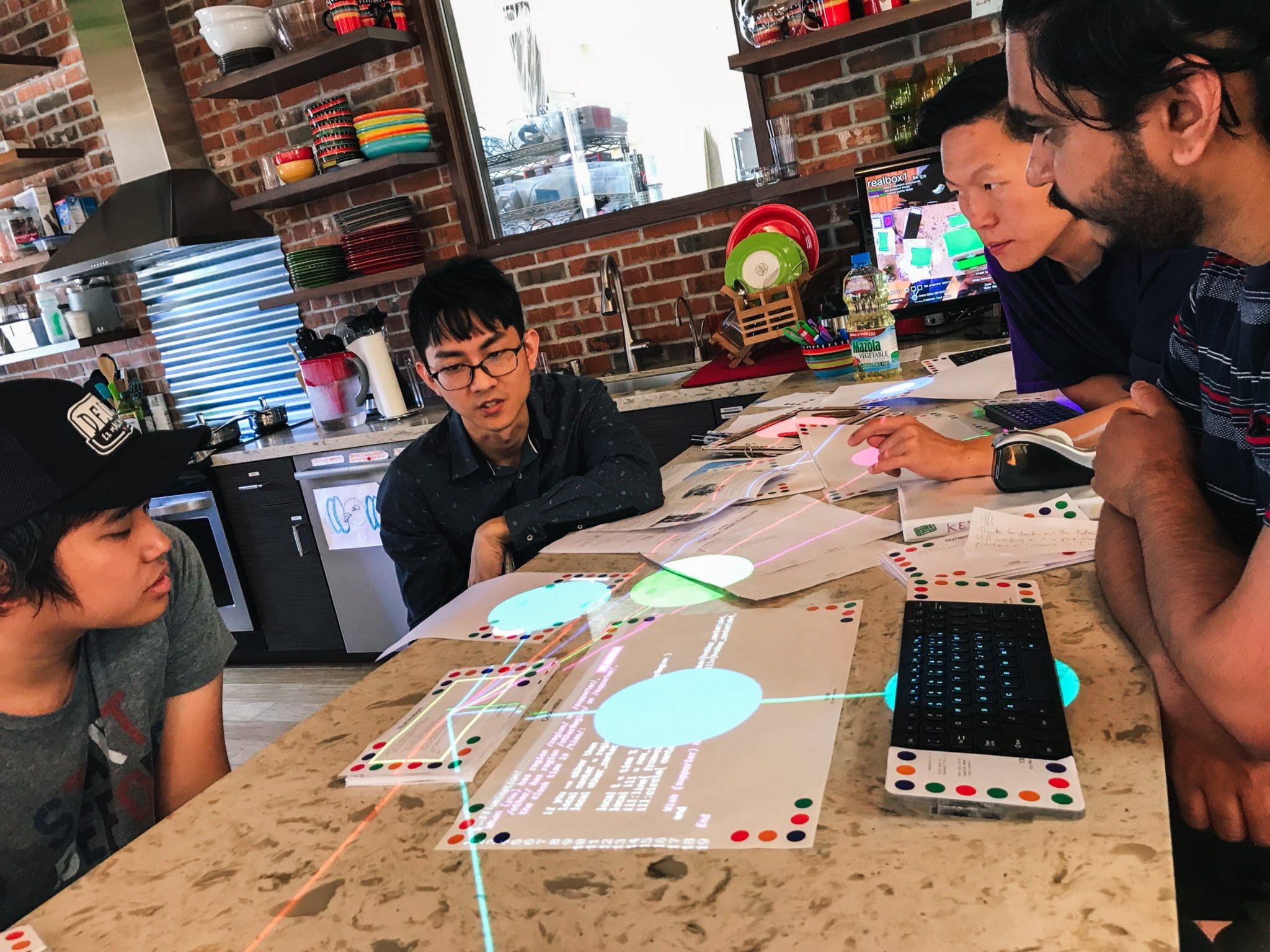

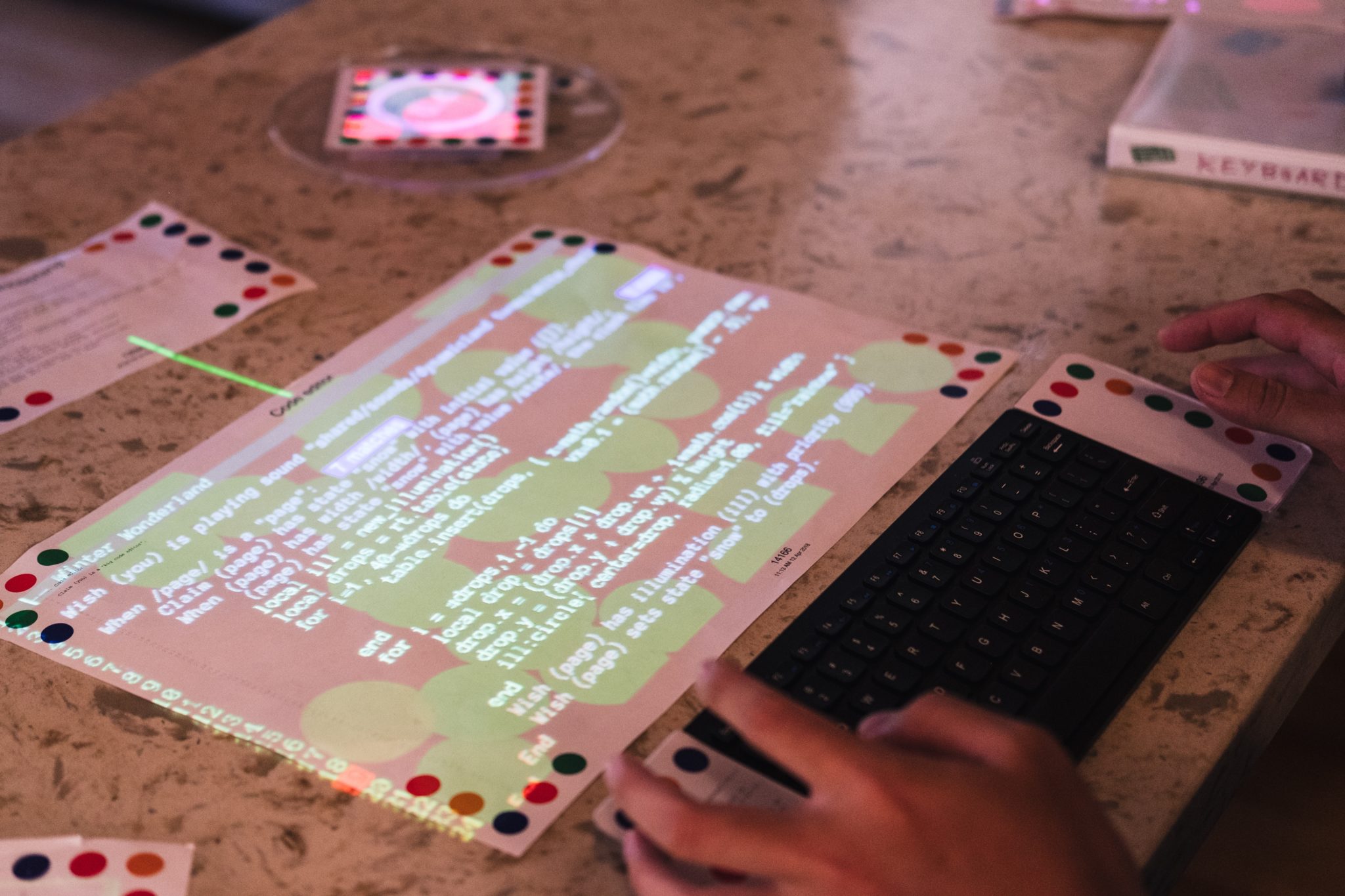




…
In June/July 2018, the Saturday Kids team spent 2 weeks in the US. Read more about the intention of this trip, what we’ve learnt from Mitch Resnick on putting fun back into learning, and what Andy Weir (author of The Martian) had to share about pushing through failure.
The post Experiencing Dynamicland – A New Computational Medium appeared first on Saturday Kids | Coding, Digital Literacy for Kids & Parents.
]]>The post #ISTE2018 | Andy Weir on curiosity, problem-solving and failure appeared first on Saturday Kids | Coding, Digital Literacy for Kids & Parents.
]]>– Nicole
Many of us might know the movie The Martian – you know, the one where Matt Damon got left behind on Mars after a mission gone wrong. Did you also know that this film was adapted from a book written by Andy Weir, a software engineer?
At #ISTE2018, we had the opportunity to listen to Andy share his story during one of the keynote sessions. It was a good talk, and he’s got a great sense of humour to boot – it almost felt like he still could not believe his luck. In sharing his journey, a couple of themes emerged which we thought might be worthwhile sharing:
On curiosity and problem solving
“What drives me to learn is just curiosity. I just enjoy it”
Andy is a sci-fi fiction writer and in his writing, the theme usually revolves around solving problems and working things out. Such as the scene in Martian where Matt Damon’s almost running out of food and tried to grow potatoes using Martian ’soil’. He shared how he specifically enjoy the process of learning new things, doing research (so as to be as scientifically accurate as possible) and that the really fun part for him personally is the researching and the problem solving. But not for solutions that other people have came up with before. For example, if he wants to make a city on the moon, he doesn’t want to see someone else’s city on the moon, but he want to make his own, and to solve each problem his own way. He attributed the problem-solving skills to what his career as a software engineer taught him – the process of breaking things down into smaller, discrete problems that each have to be solved and then put together. And what drives this all is curiosity.
Sir Ken Robinson famously said that the most important thing a teacher can do for students is to keep their curiosity alive, and if teachers can keep the flame of curiosity burning in children, then pretty much everything else will follow from that. (If you have not watched his TED Talks, do us a favour and watch at least just this one). We all know that kids are born curious, you just have to look at your own or kids around you. So what really bothers us is how that fades away when kids ‘grow up’ and starts going to school where there is often only one right way or one right answer. How would that drive innovation and creativity? This is also why at Saturday Kids, keeping curiosity in kids alive is at the core of our mission.
Failure
Andy shared how for him personally, there’s a lot of failure on the path to publishing (and that is hardly new especially for anyone in the creative field – sometimes I wonder why it’s more common to come across ‘struggling writers’, ‘struggling musicians’, ‘struggling artists’ but you seldom hear people talk about ‘struggling doctors’ or the likes. But anyways).
His story is not unusual, but what’s admirable is that he kept believing in what he did and kept at it. I believe this is considered grit (we wrote something about this here previously if you’re interested to read). And finally when he started writing for fun (that’s when The Martian came from), that’s when his luck turned around in his pursuit as a writer. I guess there’s truth to what people say about how opportunities arise when you start doing the things you love. Which leads me to the next point.
On side projects
The last thing that struck me personally was the importance of side projects. This is also something a lady I like a lot (SwissMiss) talks about – you can watch her talk here. Reality for many of us is that there’s a day job that pays the bills but does not always feed the soul. But there’s value in starting and pursing small side projects, as we’ve seen in Andy’s case as well – where writing was essentially a creative outlet for him outside of his full time job as a software engineer, and how it eventually turned into his full-time gig. And for kids, despite the demands of school, to help them identify where these outlets are and to continue to allow them to experiment, to explore.
So here is a video I found online of Andy’s ISTE talk, it’s not HD-quality but good enough to make out what he’s saying – worth checking out.
…
Thoughts, comments or feedback? Send them along to us [email protected] – we’ll love to hear from you.
The post #ISTE2018 | Andy Weir on curiosity, problem-solving and failure appeared first on Saturday Kids | Coding, Digital Literacy for Kids & Parents.
]]>The post Projects, Passion, Play and Peers: Put the Fun Back into Learning appeared first on Saturday Kids | Coding, Digital Literacy for Kids & Parents.
]]>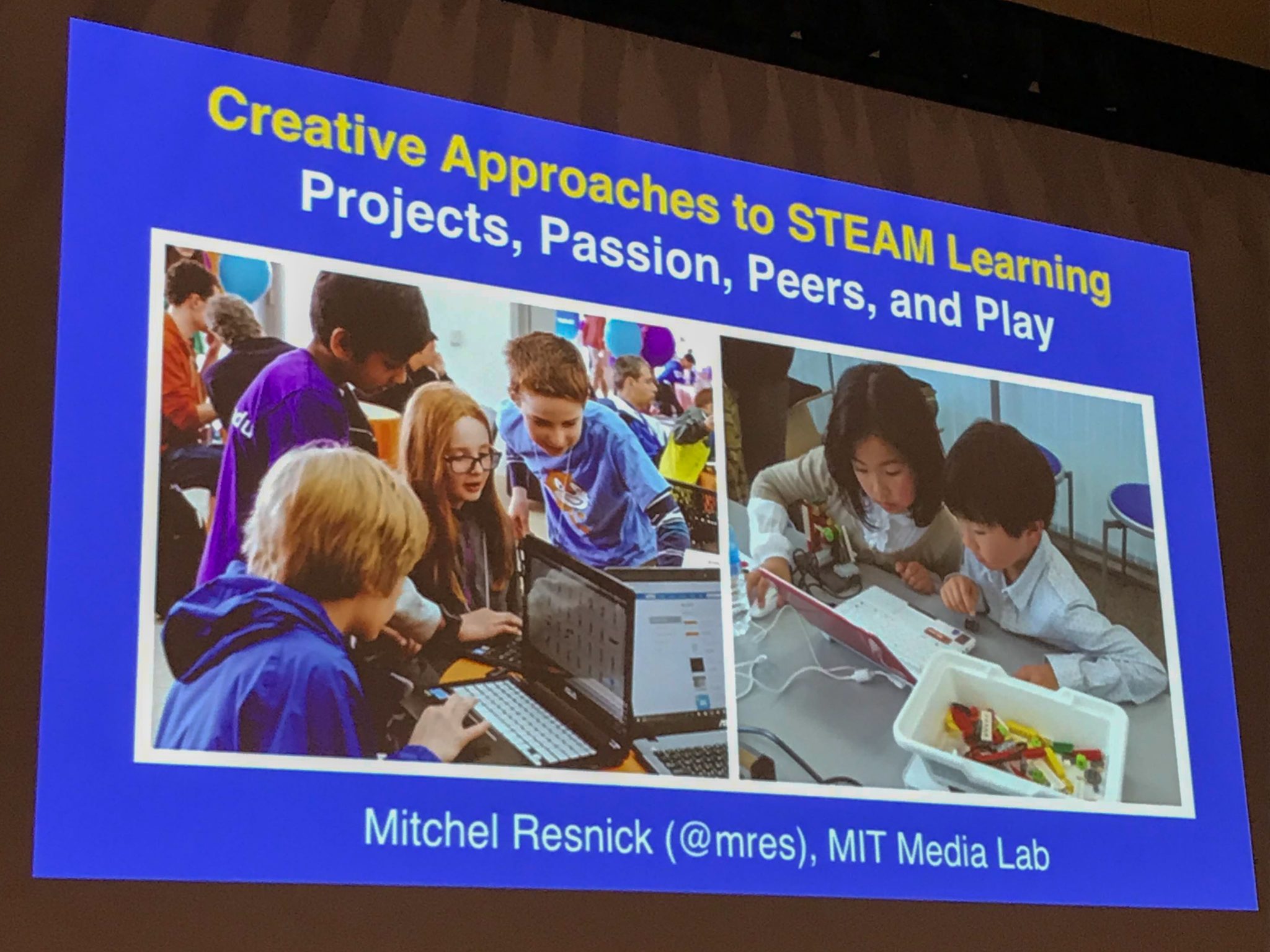
I thought about what I most wanted to share about this year’s ISTE experience, and decided ‘Creative Approaches to STEAM Learning: Projects, Passion, Peers and Play’ by Mitch Resnick (founder of Scratch and the Lifelong Kindergarten group at MIT Media Lab) is probably the session I got the most out of. My choice of Mr Resnick’s session as my favorite at this year’s ISTE has nothing to do with the fact I got a fanboy photo with Mr Resnick, obviously. If I had known he’s so tall I would have taken the photo with both of us sitting, but as always I overestimated my ability (tiptoeing in this instance).
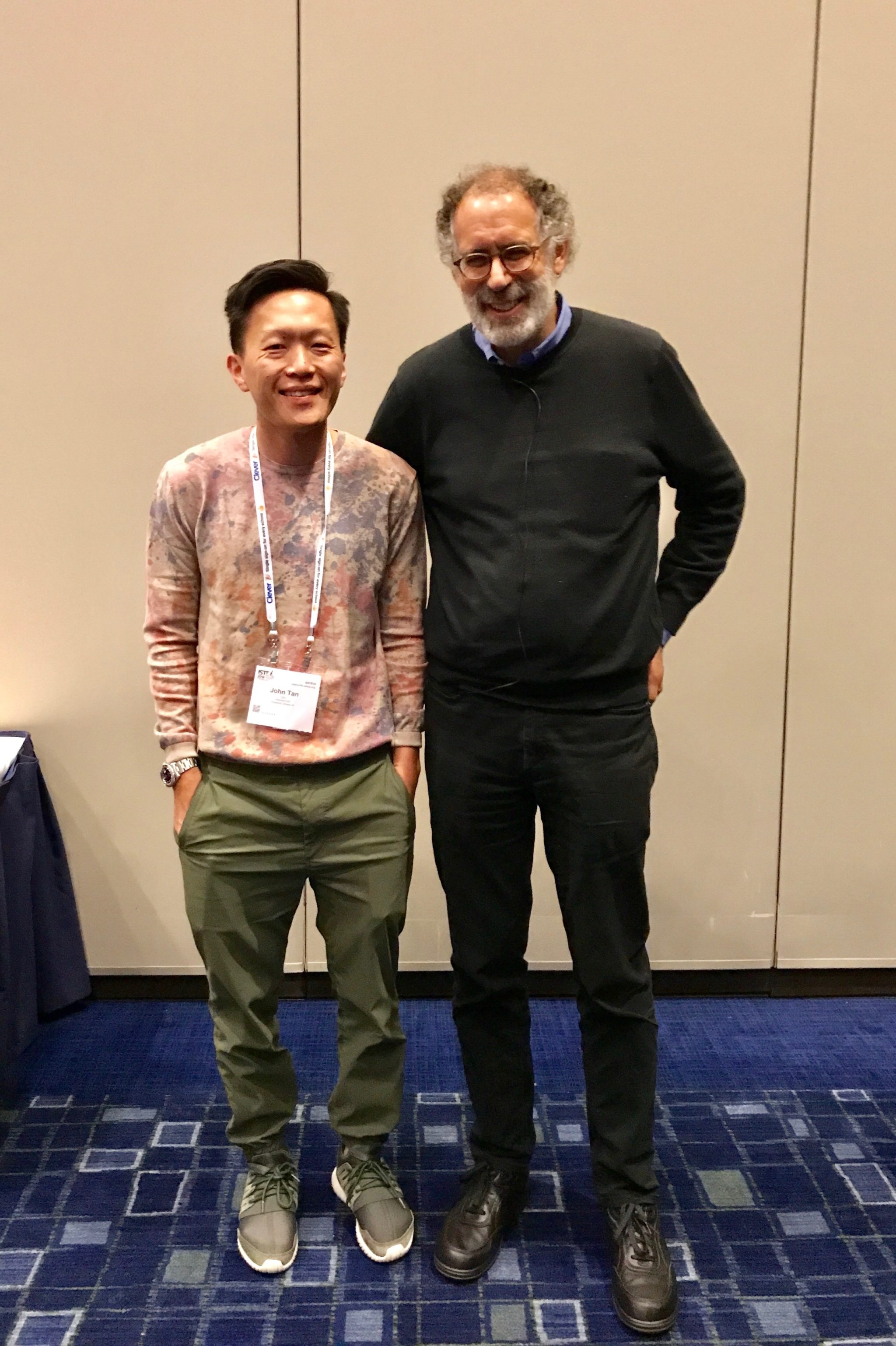
Mitch Resnick & Me!
Much of Resnick’s session is explaining ideas from his latest book ‘Lifelong Kindergarten – Cultivating Creativity through Projects, Passion, Peers, and Play’. To understand the premise of the book, we first need to understand the Lifelong Kindergarten Group that Resnick heads up at the MIT Media Lab. Lifelong Kindergarten Group is inspired by how kids playfully create things together and the learnings they gain through the creative process of taking an idea into fruition. Resnick pointed out that creative thinking is now more important than ever before, and the best way to nurture creative thinking is by focusing more on imagining, creating, playing, sharing, and reflecting, just as children do in traditional kindergartens. Sounds like a simple idea, but parents are so desperate for their child to know the alphabet by 2, write for the New York Times at 4, and win the Pulitzer before finishing kindergarten that creating and playing take a backseat.
The 4 guiding principles of the 4Ps of creative learning are Projects, Passion, Play and Peers.
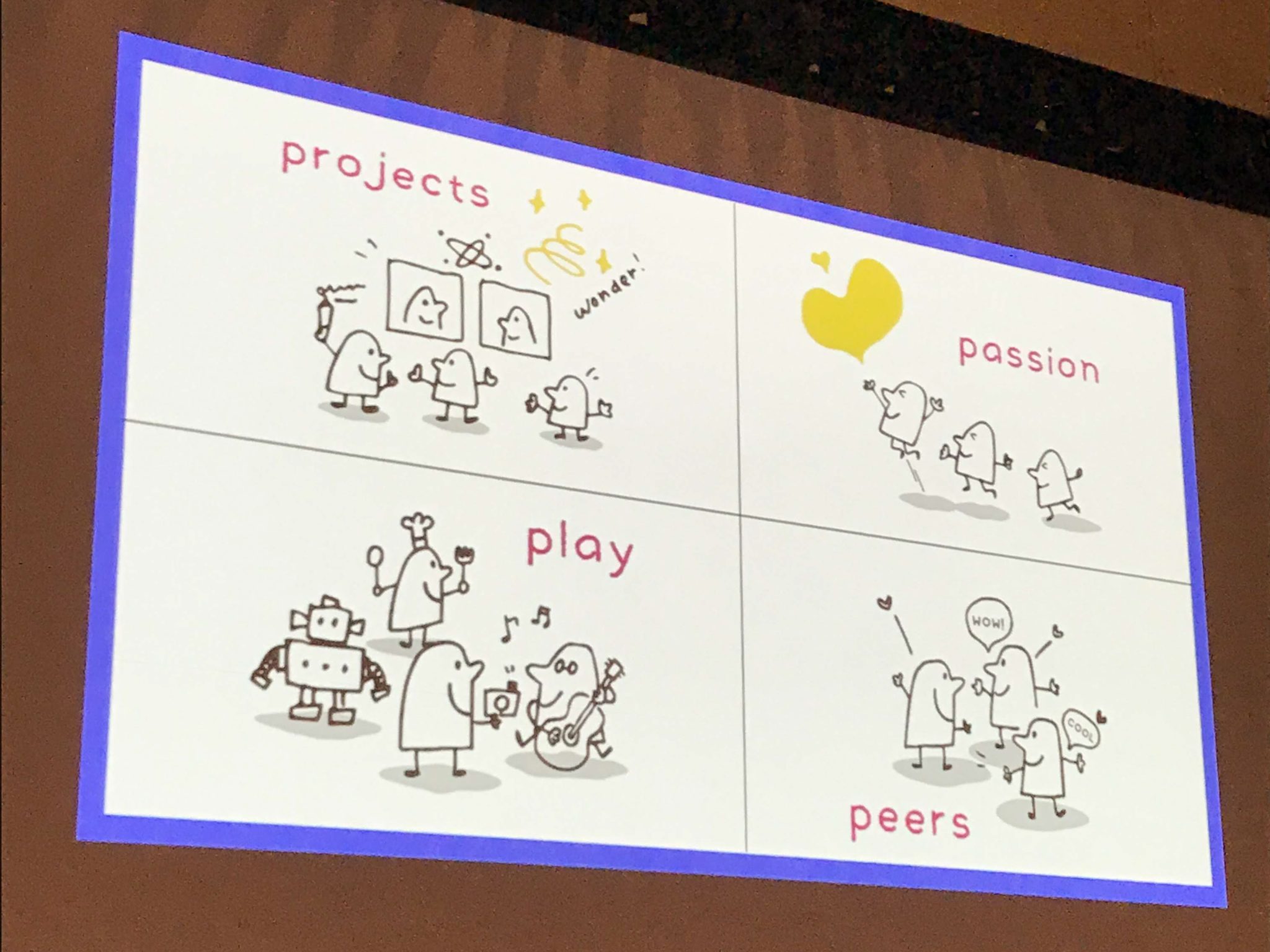
“By providing young people with opportunities to work on projects, based on their passions, in collaboration with peers, in a playful spirit, we can help them prepare for a world where creative thinking is more important than ever before.” – Mitch Resnick in Lifelong Kindergarten.
Play is one of the core principles at Saturday Kids. We believe learning should feel like play. What does play in this context mean? Not just laughter and having fun (although that is an important part of play). Not just the activity. It’s the attitude of testing, experimenting and trying, which leads us to two other core principles at Saturday Kids. Learning happens by doing. Failure is reframed as iteration. Play underpins everything we do at Saturday Kids. Our goal is to make learning fun again so kids enjoy the process instead of just focusing on the outcome. When kids enjoy learning, they become self-motivated learners and our job as educators is pretty much done.

Here’s another quote from the synopsis of Resnick’s book that pretty much sums up everything that is wrong with education today.
“In kindergartens these days, children spend more time with math worksheets and phonics flashcards than building blocks and finger paint. Kindergarten is becoming more like the rest of school. In Lifelong Kindergarten, learning expert Mitchel Resnick argues for exactly the opposite: the rest of school (even the rest of life) should be more like kindergarten.”
Indeed, mainstream education is doing a tremendous job of taking the joy out of learning. At Saturday Kids we are doing what we can to put the fun back into learning, and to create a working and learning environment that feels like kindergarten (back when kindergartens were still fun!)
– John
The post Projects, Passion, Play and Peers: Put the Fun Back into Learning appeared first on Saturday Kids | Coding, Digital Literacy for Kids & Parents.
]]>The post Mitch Resnick on the importance of the ability to think and act creatively appeared first on Saturday Kids | Coding, Digital Literacy for Kids & Parents.
]]>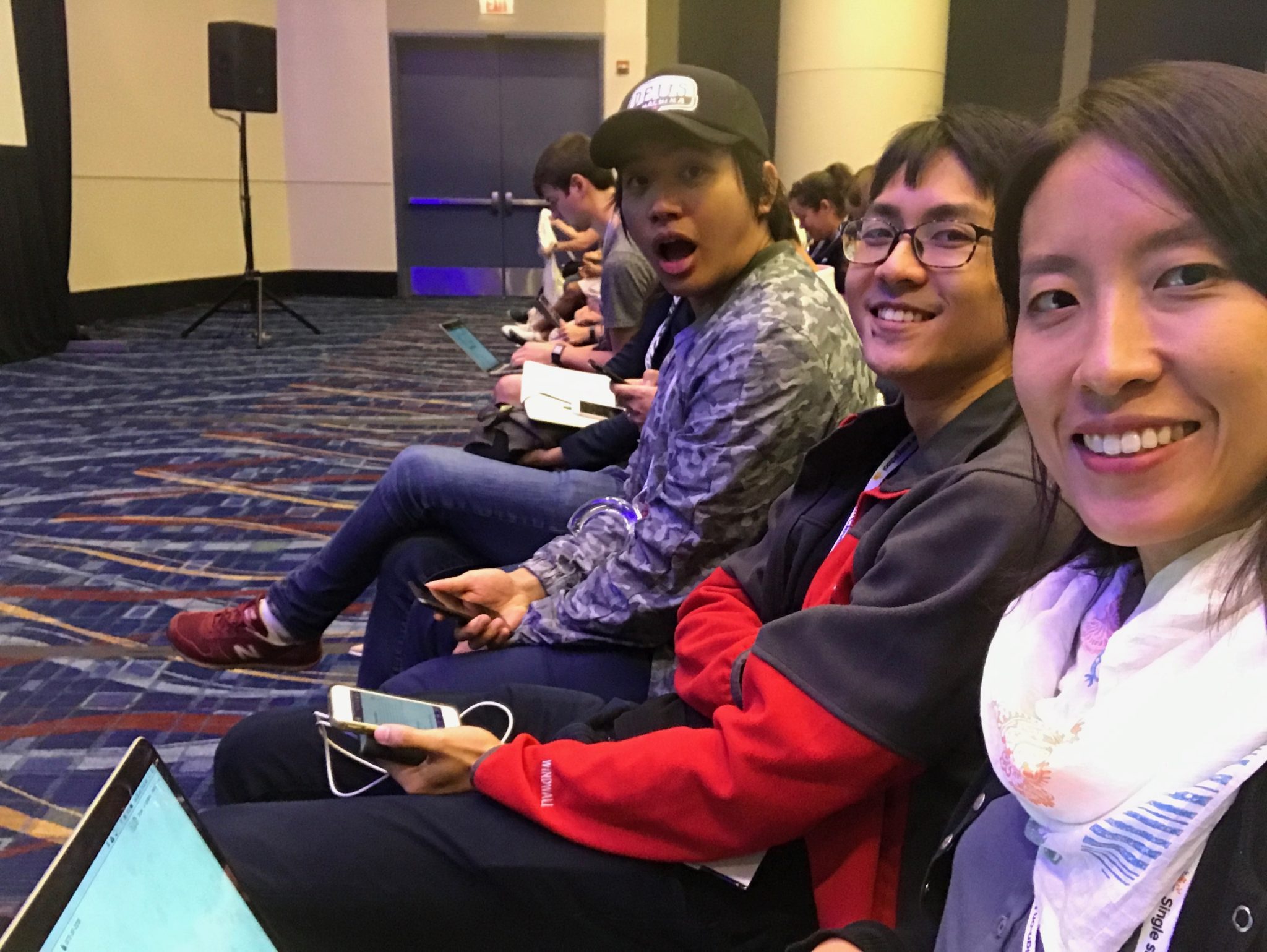
As you might know, a group of us are here in the US to attend the ISTE Conference and Expo in Chicago. The sheer scale of the conference means that we had to divide and conquer the sessions (even then we’d have only covered a fraction of it). But there was one talk that all four of us showed up and scored front row seats – a session by Mitch Resnick, founder of Scratch and Director of the Lifelong Kindergarten group at MIT Media Lab. Saturday Kids started 6 years ago as a side project running Scratch classes for kids, and in John’s words ‘without Mitch Resnick, there probably will be no Saturday Kids.”
Short of sharing a full recording (which we don’t have), here’s a few notable excerpts from his talk.
On creative thinking
“We’re living in a world where creative thinking is more important than ever before. Kids are going to be confronted with a number of unknown and unpredictable situations and the ability to come up with creative, innovative solutions, to new problems is critical to all kids regardless of what they grow up to be and work on. And it is important for all parts of life, not just the work life, but the way they interact in their community and personal lives. If you go to a lot of kindergartens these days, you see a lot of kids filling up phonics worksheets, and flashcards, kindergartens are becoming more like the rest of schools. But what we (at MIT lab) want to do is the exact opposite, and to make the rest of schools more like kindergartens.”
On the 4 guiding principles at MIT Lifelong Kindergarten
“We always want to be supporting kids working on projects, based on their passion, in collaboration with peers, in a playful spirit. We know that kids, and adults as well, will work harder and are more persistent in facing challenges when they work on things that they care about, and they also make deeper connections to the ideas when they work on meaningful projects. When we talk about connecting to kid passions, some kids will be passionate about building robots, but not all kids. We want to make sure that all kids have ways to connect with their passions, so we are always trying to develop technology and activities, where there’s many pathways where different kids can use them in their own ways, to connect with it with things they’re really interested in. I think a lot of the best learning experience happen when you start with something you’re comfortable with, and then you reach out to try something new.”
On the new Scratch 3.0 (new and exciting development)
“Today’s kids are brought up in a world where there’s a lot more devices that responds to voice. We don’t want kids to only be using those devices, we want them to be able to create devices like that, and we want to expand Scratch to have those capabilities where kids can make their own projects that respond to voice commands. We want to make Scratch into a hub where we connect things to the physical world. A big part of what we do with Scratch is to make it as intuitive as possible for kids to use, and to be creative in the physical world as well as the online world.”
On ‘new’ technology
“We try not to be driven by what’s the new technology of the day. We always want to make sure that it’s something that’s going to connect with the kids’ passion, that they can use it in collaboration with peers, and used to create their own projects.”
If you want to learn more, get a copy of his book “Lifelong Kindergarten: Cultivating Creativity through Projects, Passion, Peers, and Play” (and let us know what you think!).

The post Mitch Resnick on the importance of the ability to think and act creatively appeared first on Saturday Kids | Coding, Digital Literacy for Kids & Parents.
]]>